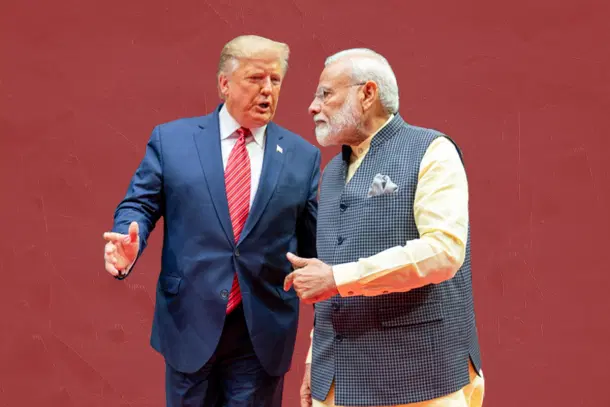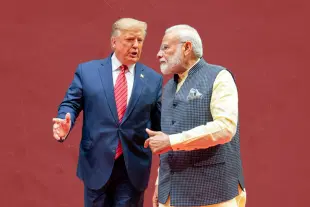World
Trump Back In White House: What It Could Mean For India, World, And The Two Ongoing Wars
Venu Gopal Narayanan
Nov 06, 2024, 06:35 PM | Updated 06:35 PM IST
Save & read from anywhere!
Bookmark stories for easy access on any device or the Swarajya app.


The emphatic re-election of Donald Trump as America’s next president elicited a spate of extremely emotional responses in different corners.
For mainstream media, it was a moment to recommence redistribution of an alarmist narrative; for the Democrats, it marks a return to the drawing board since their hoary identity politics failed to fire; and going by the gleeful tenor of ‘right-wing’ Indian social media handles, it seemed like an Indian was headed for the White House.
But to grasp the true import of Trump’s remarkable return, we have to progress beyond emotion to implication. What might those be?
First, the American deep state (a catchall phrase including the permanent executive, its political and corporate supporters, and thinkers, who devised a set of strategies to ensure continued global dominance by America following the end of the Cold War):
Its consolidation as the domestic anti-Trump pole will now progress more expeditiously and more vigorously since Trump has now been re-established (ironically by popular will) as a more serious hindrance to their aims than China or multilateralism. Worse for the deep state, there is every chance that both ongoing wars in Ukraine and Gaza will either be brought to an end by sovereign multilateral coordination, or, they will be brushed under the carpet to ensure a return to business-as-usual (for the most part).
Second, as a corollary, a political realignment will be necessitated because no such entity can function in the social domain without a public face. This will be characterized by a blurring of ideological lines between Democrats and Republicans, leading to more defections between the two political parties.
We already got a taste of this during the presidential campaign, on both sides, with a notionally-Democrat Tulsi Gabbard wreaking havoc in Democrat ranks, and true-blue Republican royalty like Liz Cheney openly canvassing for the Democrats. It may seem confusing at first glance, even odd, but this is what happens when political ideology goes down a rabbit hole with as much velocity as it has in America.
If the parties don’t know what they stand for anymore, then imagine how much more confused the lay politician, the parties’ rank and file, and the voters, would be? America is sort of where India was early this century, seeking new direction; it took two general elections, a listless decade, and the furious advent of Narendra Modi to shake things up and cut a new path.
Third, foreign trade: for Trump the businessman, balancing the books and reducing trade deficits is a natural act, one which he will follow as assiduously as he did from 2016 to 2020. Taking a leaf from his first term playbook, then, we can expect increased exports of oil and gas from America to the world’s largest energy markets like China, India, and Europe.
This is what he did fairly successfully until the pandemic, and ironically, what Joe Biden tried to replicate, although with disastrous results. The first order effects are good for America since heightened activity in the upstream hydrocarbon sector means more jobs, economic growth, lower trade deficits, and lower inflation. Oil, particularly ‘shale’ oil, did more to rev the American economy than any other sector, and that can happen again.
The flip side is that some India jobs may get squeezed as Trump looks inward, and we may witness a few visa wars.
Fourth, by corollary, foreign affairs: getting China and India to offtake American crude means an honest trade-off on the diplomatic front which, for all practical purposes, would broadly mean that India and China are left alone to consolidate their growing global positions without too much American interference in domestic affairs. There will always be some noise, of course, since Trump has to play to his domestic galleries for form’s sake.
As a result, and in response, it is possible that the big oil and gas exporters like Saudi Arabia may unilaterally cut prices to retain market share, even as America uses all its remaining leverage to squeeze Qatar, and keep Iran out of the game. One indicator on how this play may progress is to wait and watch to see whether India resumes the purchase of crude oil from Iran or not (something which came to a grinding halt during Trump’s first term in office).
If that happens, all bets are off on how global dynamics will change, because it would mean that America has accepted multipolarity as the new global reality.
Another indicator is the supply of American jet engines for India’s Tejas fighter planes – supply has been halted (there is no diplomatic way of saying this) through 2024, and the Tejas manufacturing lines are stuck. If supply resumes, and lost time is made up for, then we may presume that the bilateral equation is working.
Fifth, there will be some sort of rollback of America’s position on the two ongoing wars in Ukraine and Gaza. Both wars will either be ended by multilateral sovereign fiat, or, they will be rudely brushed under the carpet to ensure a return to normalcy. It has to be business as usual at the soonest, for America, and for the rest of the world, since, lest we forget, instead of getting a recovery year following the pandemic, we got two ugly proxy wars, soaring inflation, and debilitating trade disruptions (something which India avoided only because we astutely sidestepped the West’s sanctions on Russia).
Sixth, a debate on electoral reforms in America will now begin in earnest. The system is broken, and it needs to be fixed. What contours that reform takes is merely a matter of detail, but, in principle, a conversation on its necessity will commence. It is the only way America can avoid the civilizational collapse it is currently headed towards, and Trump knows that.
Thus, in conclusion, we can say that while a Trump victory is strategically beneficial to India, it may be commercially challenging. This is the clear contradiction which India’s foreign office will have to work with, and try to reconcile to the extent possible, as a new chapter is scripted in Indo-American relations.
Venu Gopal Narayanan is an independent upstream petroleum consultant who focuses on energy, geopolitics, current affairs and electoral arithmetic. He tweets at @ideorogue.





